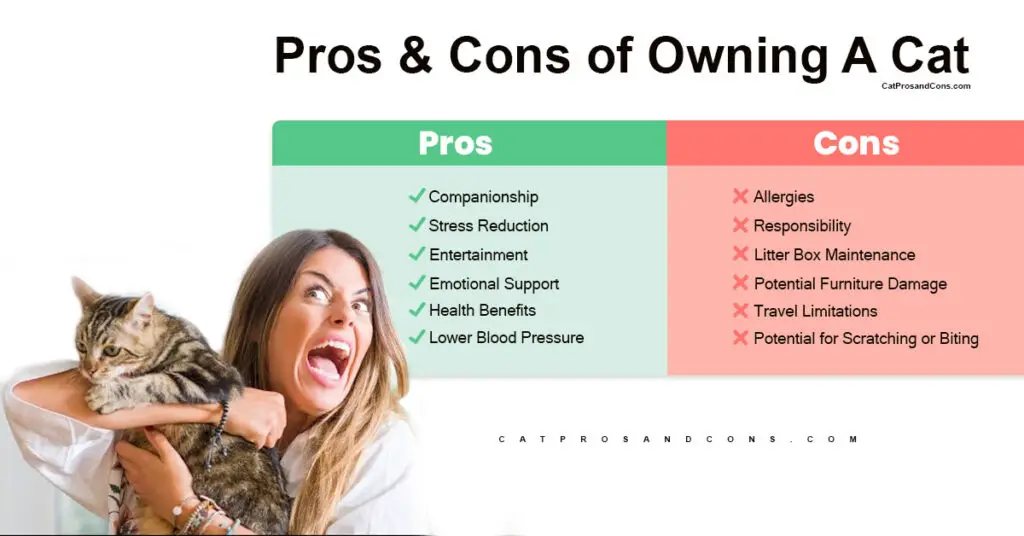Top Pros Of Owning A Cat: Why Cats Make The Perfect Companion
Owning a cat can be one of the most rewarding experiences in life. Cats are not only adorable but also bring a variety of benefits to their owners. From improving mental health to providing companionship, the pros of owning a cat are numerous and scientifically proven.
As more people are embracing the idea of adopting pets, cats have emerged as a favorite choice for many households worldwide. According to the American Pet Products Association, approximately 45.3 million households in the United States own at least one cat. This trend highlights the growing popularity of cats as cherished family members.
In this article, we will explore the top advantages of owning a cat, backed by research and expert insights. Whether you're considering adopting a cat or already a proud cat owner, this guide will provide valuable information to enhance your understanding of the benefits that come with feline companionship.
Read also:Josh Fraser Landon A Rising Star In The World Of Entertainment
Table of Contents:
- Biological Benefits of Owning a Cat
- How Cats Boost Mental Health
- Cats Are Low-Maintenance Pets
- Can Owning a Cat Reduce Allergies?
- Health Benefits of Cat Ownership
- Financial Benefits of Having a Cat
- Cats as Emotional Support Animals
- Building Long-Term Relationships with Cats
- Environmental Impact of Cat Ownership
- Conclusion: Why Cats Are the Ultimate Companions
Biological Benefits of Owning a Cat
Cats offer several biological benefits that contribute to overall well-being. One of the most fascinating aspects of cat ownership is the positive impact on heart health. Studies have shown that people who own cats are less likely to suffer from heart attacks and strokes compared to non-cat owners. This is attributed to the calming effect cats have on their owners, reducing stress levels and promoting relaxation.
Lower Blood Pressure
Cats have been found to help lower blood pressure in their owners. The soothing purring of a cat has a therapeutic effect that can reduce tension and anxiety. According to research published in the Journal of Vascular and Interventional Neurology, stroking a cat can lower blood pressure by up to 10 points.
Improved Immune System
Exposure to cats can also strengthen the immune system, particularly in children. Early contact with cats can help build resistance to allergens, reducing the likelihood of developing allergies later in life. This phenomenon is known as the "hygiene hypothesis," which suggests that a certain level of exposure to microorganisms can enhance immune function.
How Cats Boost Mental Health
One of the most significant pros of owning a cat is the positive impact on mental health. Cats provide emotional support, reduce loneliness, and help alleviate symptoms of depression and anxiety. Their presence offers comfort and companionship, creating a sense of security and well-being.
Reduced Stress and Anxiety
Interacting with cats has been shown to release endorphins, the body's natural mood enhancers. Activities such as petting, playing, and simply observing a cat can significantly reduce stress levels. A study conducted by the Human-Animal Bond Research Institute found that 74% of pet owners reported mental health improvements from owning a pet.
Read also:Maisie Williams Secy A Comprehensive Look Into The Actresss Career And Journey
Combatting Loneliness
For individuals living alone, cats serve as loyal companions, reducing feelings of isolation. Their affectionate nature and playful behavior can create a warm and inviting environment, making homes feel more lively and welcoming. This is particularly beneficial for seniors and those dealing with social anxiety.
Cats Are Low-Maintenance Pets
Compared to dogs, cats are relatively low-maintenance pets, making them an ideal choice for busy lifestyles. They require less attention and can be left alone for longer periods without needing constant supervision. This independence allows cat owners to balance their personal and professional commitments without worrying about their pet's well-being.
- Cats are self-groomers, reducing the need for frequent bathing.
- Litter box training is straightforward and requires minimal effort.
- Cats do not require daily walks, saving time and energy.
Can Owning a Cat Reduce Allergies?
Contrary to popular belief, owning a cat can actually help reduce allergies in some individuals. Early exposure to cats, especially during infancy, can desensitize the immune system to allergens. Research published in the Journal of Allergy and Clinical Immunology indicates that children exposed to cats during their first year of life are less likely to develop allergies later in life.
Building Tolerance
Regular interaction with cats can help build tolerance to pet dander, one of the most common allergens. While this may not eliminate allergies entirely, it can significantly reduce their severity. For allergy sufferers, hypoallergenic cat breeds such as the Siberian or Devon Rex may be a suitable option.
Health Benefits of Cat Ownership
In addition to mental and emotional health, owning a cat can also improve physical health. Cats encourage a more active lifestyle through play and interaction, promoting physical fitness and motor skills. They also provide opportunities for mindfulness and relaxation, contributing to overall wellness.
Encouraging Physical Activity
Cats love to play, and engaging in interactive games can increase physical activity levels. Toys such as laser pointers, feathers, and balls can stimulate their natural hunting instincts, keeping them active and entertained. This playful behavior not only benefits the cat but also encourages owners to move more, promoting a healthier lifestyle.
Mindfulness and Relaxation
Spending time with a cat can foster mindfulness and relaxation. The rhythmic sound of purring and the gentle touch of their fur can create a calming atmosphere, helping to reduce stress and improve sleep quality. Many cat owners report feeling more relaxed and centered after spending time with their feline companions.
Financial Benefits of Having a Cat
While owning a cat does come with certain costs, such as food, veterinary care, and supplies, the financial burden is generally lower compared to other pets. Cats require fewer resources and are less expensive to maintain, making them an affordable option for pet lovers on a budget.
- Cats consume less food than larger animals, reducing feeding expenses.
- They do not require professional grooming services, saving money on maintenance.
- Veterinary costs for cats are often lower than for dogs, as they are generally healthier and less prone to certain conditions.
Cats as Emotional Support Animals
Cats are increasingly being recognized as effective emotional support animals (ESAs). Their calming presence and intuitive nature make them ideal companions for individuals dealing with mental health challenges. ESAs provide comfort and reassurance, helping to alleviate symptoms of anxiety, depression, and PTSD.
Qualifying for ESA Status
To qualify a cat as an emotional support animal, individuals must obtain a letter from a licensed mental health professional. This letter verifies the need for an ESA and grants certain rights, such as permission to have the cat in housing that does not allow pets. While ESAs do not have the same legal protections as service animals, they still offer significant benefits to their owners.
Building Long-Term Relationships with Cats
Cats form strong bonds with their owners, creating long-lasting relationships built on trust and affection. Their ability to understand human emotions and respond appropriately makes them exceptional companions. By investing time and effort into nurturing this relationship, cat owners can enjoy a deep and meaningful connection with their feline friends.
Understanding Cat Behavior
Learning about cat behavior and communication can enhance the bond between owner and pet. Recognizing signs of happiness, stress, or discomfort allows owners to better meet their cat's needs and ensure their well-being. This mutual understanding fosters a harmonious living environment and strengthens the relationship.
Environmental Impact of Cat Ownership
While cats provide numerous benefits, it's important to consider their environmental impact. Responsible pet ownership involves minimizing the ecological footprint of cats through sustainable practices such as using eco-friendly products and managing outdoor access to protect local wildlife.
Sustainable Cat Care
Adopting sustainable cat care practices can help reduce the environmental impact of cat ownership. This includes using biodegradable litter, choosing eco-friendly toys, and feeding cats with sustainably sourced food. By making conscious choices, cat owners can contribute to a healthier planet while still providing the best care for their pets.
Conclusion: Why Cats Are the Ultimate Companions
Owning a cat offers a multitude of benefits, from improving mental and physical health to providing companionship and emotional support. Their low-maintenance nature, affordability, and ability to form deep bonds make them ideal pets for people of all ages and lifestyles. By understanding the pros of owning a cat and adopting responsible pet ownership practices, individuals can enjoy a fulfilling and rewarding relationship with their feline friends.
We encourage you to share your thoughts and experiences in the comments below. If you found this article helpful, please consider sharing it with others who may benefit from the information. For more insights on pet care and wellness, explore our other articles and resources.


